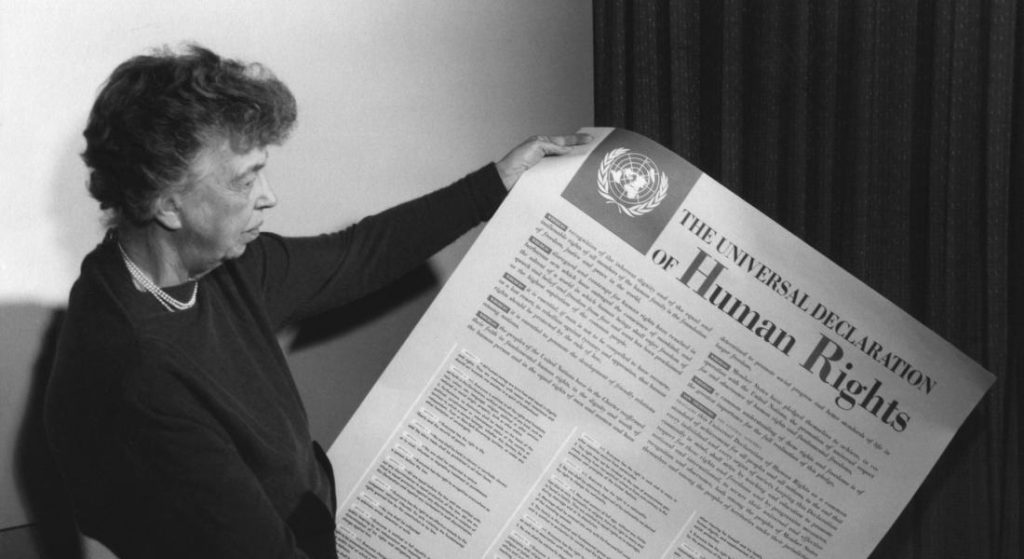A University of Notre Dame expert in international human rights law is part of a federal commission that recently released a report affirming America’s unique role in protecting human rights around the world.
“The United States has always had a distinctive voice and a distinctive approach to human rights that is very deeply connected to its own history and to its own political traditions. This report is important because it brings together these two things: our commitment to the global human rights project, and the recognition of America’s rights and constitutional traditions,” said Paolo Carozza, director of the Keough School’s Kellogg Institute for International Studies and a member of the US State Department’s Commission on Unalienable Rights.
The Commission was formed last year to review and advise US Secretary of State Michael Pompeo on the role of human rights in US foreign policy. Its assessment focused on principles, not policy formation.
Two of the Commission’s 11 members are affiliated with Kellogg: Carozza, a Notre Dame law professor, and Distinguished Research Affiliate Mary Ann Glendon, who heads the Commission.
Glendon, the Learned Hand Professor of Law at Harvard University, said the group’s work is important because of the need to strengthen the intellectual foundations of the post-World War II human rights project. She noted that some powerful countries are openly challenging the basic premises of the Universal Declaration of Human Rights (UDHR)—the 1948 document, ratified by the United Nations General Assembly, that has had outsized influence on the adoption of human rights norms globally—even as political and civil liberties worldwide are in steady decline.
“By taking a close look at the international principles that once commanded near-universal consensus, the Commission hopes its report will assist the much-needed discussion of how best to promote the noble aspiration in the UN Charter and the UDHR for, as the Charter says, ‘better standards of life in larger freedom’ for everyone, everywhere,” she said.
According to the report, released July 16, the Commission determined that in today’s multipolar world, “the ambitious human rights project of the past century is in crisis.
“The broad consensus that once supported the UDHR’s principles is more fragile than ever, even as gross violations of human rights and dignity continue apace,” it continued. “In short, human rights are now misunderstood by many, manipulated by some, rejected by the world’s worst violators, and subject to ominous new threats.”
The Commission urged the vigorous championing of human rights in foreign policy and noted the “enormous” influence the US, as a model of a multicultural democracy, holds in promoting human rights.
Carozza said one of the Commission’s most important observations is the strong link between the rise of authoritarian regimes around the world and the steady erosion of freedoms and rights. The report also highlights the close link between human rights and democratic self-governance, as well as the importance of economic and social rights to the international human rights agenda.
“The report observes that the best way the US can promote economic and social rights is to pursue foreign policy that promotes international development in broad ways, in the integral or holistic ways that Kellogg tries to champion,” he said.
Both Carozza and Glendon are regarded as top experts in their fields. Carozza was appointed by the State Department last year to serve a four-year term on the Venice Commission, a prestigious body of lawyers, judges, academics, and government officials that advises the Council of Europe on constitutional matters.
He previously served as a member of the Inter-American Commission on Human Rights and was its president from 2008 to 2009. The organization is the principal international body responsible for the promotion and protection of human rights in the Western Hemisphere.
Carozza was awarded Notre Dame’s Reinhold Niebuhr Award in 2019 in recognition of his research and teaching on the foundational principles of human rights law. The award is given annually to a Notre Dame faculty member whose work and life promote or exemplify social justice. At the end of his tenure at the Inter-American Commission on Human Rights, he was awarded the Order of Merit of Bernardo O’Higgins, Chile’s highest honor given to non-nationals, for his service to the protection and promotion of human rights in the Americas.
Glendon is a former US ambassador to the Holy See. She has served on the US Commission on International Religious Freedom and the US President’s Council on Bioethics.
Carozza noted that the Commission included both scholars and activists from a variety of backgrounds and areas of expertise.
“It was a serious, intense, and diverse group of people, so it was not easy to come up with a report that we would agree upon,” he said. “But the fact that we had different backgrounds and points of view in the end added to our capacity to produce a report that I hope has lasting value.”
Originally published at kellogg.nd.edu on July 22, 2020.


